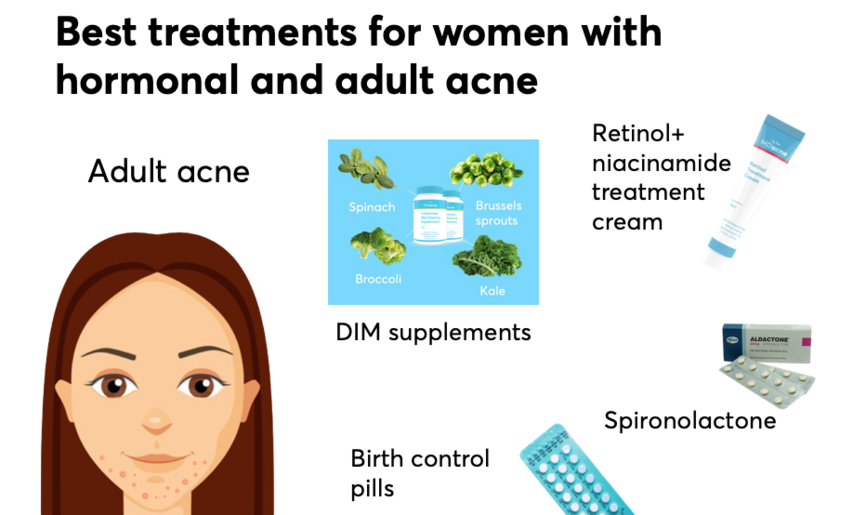Best retinol products for adult acne

Acne, fine lines, wrinkles, and dark spots are common skincare issues many young and adult women struggle with. The correct retinol cream is one option to fight those skin issues without a dermatologist's office visit.
What is Retinol?
Retinol, a member of the vitamin A family, is a superstar ingredient in skincare. Derived from vitamin A, Retinol speeds up skin cell turnover, boosts collagen production, and addresses various skin issues like acne, signs of aging, and uneven skin tone. Its ability to transform your complexion has made it a staple in nighttime skincare routines for women and men alike.
How Retinol Fights Acne
Acne occurs when oil, dead skin cells, and bacteria clog pores, leading to whiteheads, blackheads, and pimples. Retinol helps by:
- Unclogging pores: Speeds up cell turnover to prevent blockages.
- Reducing oil production: Regulates sebum, a key culprit in acne.
- Fighting inflammation: Soothes redness and swelling associated with breakouts.
Acne Stats You Should Know
An estimated 12–22% of adult women in the U.S. struggle with acne. Hormonal changes, stress, and certain medications can exacerbate breakouts. Retinol’s ability to regulate skin cell behavior makes it a valuable tool in the fight against adult acne.

How Retinol Battles Signs of Aging
Aging skin naturally loses elasticity and hydration, leading to fine lines and wrinkles. Retinol combats these signs by:
- Boosting collagen production: Firms the skin and reduces wrinkles.
- Increasing cell turnover: Smooth texture and brighten dark spots.
- Neutralizing free radicals: Protects against environmental damage.
Learn more about how retinol fights aging here.
Is Retinol Right for You?
Retinol is incredibly versatile but comes with a few caveats:
- Dry or sensitive skin? Start slow and opt for lower concentrations.
- Pregnant or breastfeeding? Avoid Retinol, as it may cause harm.
- New to Retinol? Begin with a pea-sized amount twice a week, gradually increasing frequency.
How to Use Retinol
- Start Slow: Apply a pea-sized amount 2–3 times weekly at night.
- Avoid Sensitive Areas: Steer clear of the eyes, mouth, and edges of the nose.
- Sunscreen is a Must: Retinol increases sun sensitivity, so use a broad-spectrum SPF 30+ daily.
- Moisturize: Use a hydrating moisturizer on non-retinol nights to keep your skin balanced.
Check out our sunscreen recommendations here.
Retinol for Different Skin Types
- Dry Skin: Opt for creams with hydrating ingredients.
- Oily Skin: Lightweight gels are ideal for avoiding added shine.
- Sensitive Skin: Choose gentle formulations with soothing agents like niacinamide.
Find the best retinol products for your skin type here.
Top Retinol Products to Consider
MDacne Retinol Treatment Cream
- Concentration: 0.25% and 0.5% retinol.
- Key Ingredients: Niacinamide for hydration, aloe vera, and chamomile for calming irritation.
- Why It’s Great: Perfect for acne-prone skin; unclogs pores while reducing redness and hyperpigmentation.
Shop MDacne Retinol Cream here.
Drunk Elephant A-Passioni Retinol Cream
- Concentration: Vegan Retinol with a triple peptide blend.
- Bonus Ingredients: Vitamin F for moisture, kale, and winter cherry for antioxidant protection.
- Why It’s Great: Mixable with other Drunk Elephant products for customized care.
Learn more about Drunk Elephant Retinol Cream here.
FAQs
Q: Can Retinol irritate my skin?
A: Yes, especially for first-time users. Start with a low concentration and gradually increase use to minimize dryness and irritation.
Q: How long before I see results?
A: Patience is key. Expect noticeable improvements in 6–12 months with consistent use.
Q: Can I use Retinol with other products?
A: To prevent over-irritation, initially avoid combining Retinol with strong exfoliants like AHAs or BHAs.
The Bottom Line
Retinol is a powerful addition to your skincare arsenal, whether you’re fighting acne, wrinkles, or uneven skin tone. The key to success is starting slow, choosing the right product for your skin type, and committing to consistent use. With patience, Retinol can transform your skin, making it smoother, clearer, and more radiant.
Shop MDacne’s Retinol + Niacinamide Kit here.
Shop:
MDacne's Retinol + Niacinamide Kit 60 Days (amazon).
Retinol Treatment System - Perfect Retinol starter kit
To find the right acne treatments for your unique skin, take the free skin assessment by clicking here.



